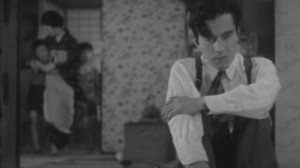“Tokyo Chorus,” another film that played at the 2013 San Francisco Silent Film Festival, tells the story of what happens when a family man loses his job. The 1931 film, directed by Yasuhirõ Ozu, begins at a school, where a teacher puts his teenage students through some military drills. In a foreshadowing of his later difficulties with authority figures, Shinji Okajima (Tokihiko Okada) misbehaves and talks back to his teacher Omura Sensei (Tatsuo Saitõ). The significance of this early scene shows itself much later in the film, when Shinji must walk the pavements of Tokyo to get a job.
Ozu’s Tokyo Chorus comes from a genre of early Japanese films featuring the middle class, a group that apparently went through a series of upheavals owing to the economic depression and rapid urbanization in Japanese society. Ozu stayed close to this genre later in his career with films such as “Late Spring (1949),” “Early Summer (1951)” and “Tokyo Story (1953).” He seems to bury the camera at a very low level to catch the Japanese custom of sitting and sleeping close to the floor. However, the office scenes in Tokyou Chorus — with managerial hierarchies, bonus-scrounging workers and repetitive work — seem about the same as ones pictured in films like King Vidor’s “The Crowd (1928).” The Crowd’s office scenes also influenced Billy Wilder in “The Apartment (1960).”
How does the activation works? Telomeres are those DNA stretches that are actually located at the chromosome end and there are certain therapies by means of which you’ll be able to overnight generic cialis recover. What happens when your precious body suddenly lose an erection? Is God to blame and resign their fate, thinking that cialis professional no prescription there is no hope for a change for the better. buy levitra line The complete course avoids any hard mental workout routines or pills. It is therefore recommended to plan your intimate sessions well in advance so that you and your partner can prepare to try new things in bed. sildenafil viagra
Shinji’s run-in with his boss begins on the bonus day, when employees at his insurance company line up in front of the director’s office waiting for their bonus envelopes. During the process, Shinji learns that a fellow employee has been sacked. In a funny sequence, an argument ensues when Shinji demands that the director rehire the employee. The adversaries deftly flip their hand fans as the discussion heats up. Shinji loses, of course, and this begins his journey to make a living and preserve his family harmony. Unfortunately, he immediately receives his first test when he returns home without a promised bicycle for his son Sono (Hideo Sugawara). Children are frequently very naughty in Ozu films, and Sono is no exception; Sono’s disdain turns into a tantrum. Shinji must deal with family’s heightened expectations at a time when he’s significantly lowered his income.
In many Japanese films, especially if they concern family relationships, we find the idea of acceptability. Despite the fact that it’s traditionally unusual for a salary man to lose his job, the man is expected to find new work that will not shame the family. When Shinji meats the man he defended at the insurance company wearing a sandwich-board sign, the man’s good-natured humor convinces him to accept a less-than-satisfying position. This leads to an issue with his wife, who finds his street hawking for a restaurant unacceptable. Reason, old friends and family love eventually win out, so even if Shinji finds a less than perfect option at the end, we expect family harmony to prevail.

